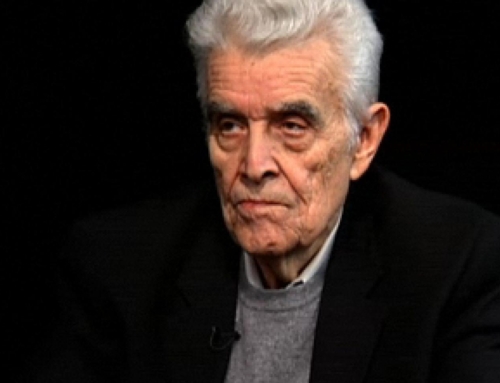Fr James Martin SJ has tweeted his objection to ad hominem attacks and name calling:
Gospel: Today Jesus says that if you call your brother a name you will go to hell: “Whoever says, ‘You fool,’ will be liable to fiery Gehenna” (Mt 5:22) Jesus took a dim view of ad hominem attacks and personal vilification. Hear, Catholic bloggers and websites. Hear, church.
This is a little bit like the girl on the playground sticking out her tongue at the person who just called her “Fatty” but Fr Martin has a point.
If you scroll through the responses to his tweets and Facebook page and read some of the conservative comments about him, we have to admit that there is some genuine poison out there. Such vituperative name calling is not only unkind, but it is counter productive. If you disagree with a person the best way to get other people on his side is to call him a mean name.
Fr Martin is especially good at cashing in on anything remotely resembling persecution. He plays the victim at the first sign of any harshness, and goes on a passive-aggressive attack. Therefore calling Fr Martin nasty names doesn’t really get you anywhere.
But I’m glad Fr Martin has brought up the subject of name calling. It’s not helpful and it should stop. If people have substantive contributions to make in response to his activism, they should do so with fact, intelligence and a sense of humor and a sense of proportion.
It is interesting that he has directed his criticism to bloggers and website authors, but I’m glad he didn’t leave it there. He also called on the whole church to hear his critique. This is good because he must therefore also be criticizing his boss, because Pope Francis has shown himself to be quite the master of name calling.
You may have come across this website which humorously gathers together all the pope’s name calling: The Pope Francis Bumper Book of Insults. I expect Fr Martin may have overlooked this interesting website which catalogues Pope Francis’ penchant for creatively nasty name calling. One of my favorites is “Self Absorbed Promethean Neo-Pelagian” then there is “fomenter of coprophagia”, “Leprous Courtier”, “Renaissance Prince,” “Mr and Mrs Whiner” and “long faced, mournful, funeral Christian” and more. Much, much more.
Fr Martin is very courageous to call the Pope out publicly for his name calling!
I’m not quite so courageous, nor am I so prim and scrupulous as Fr Martin. I think that the pope’s colorful language actually adds some juice and oomph to the church. It shows he’s got some real grit, and within his potshots he has hit the target more than once.
Of course the defenders of Pope Francis will quite rightly say, “But Jesus used harsh language! He called the Pharisees ‘hypocrites, white washed tombs, serpents and Sons of Satan.” Indeed he did, and so did the prophets before him.
So I guess the rule against name calling is not quite so absolute as Fr Martin makes out since the Holy Father and Jesus himself have a pretty impressive record in that regard.
I think, however, one can make distinctions. To call someone a horrible name just to smear that person or accuse them falsely is wrong. It is a form of hate, and to hate someone is to wish them harm.
The second reason it would be wrong to call names is because you are putting that person into a category and then condemning them. This happens when we call people a “Nazi” or “Alt-right” or “Commie” or “Liberal Looney” or some racial or ethnic epithet.
In that case the name calling is not the issue. The issue is that you have not treated that person with honor and unique respect. You have not listened to him or tried to understand his point of view. You’ve just condemned him and eliminated him by putting him into a condemned group.
The third problem with name calling is to use a name that is accurate, but to exaggerate their crime with the use of a highly charged and emotive name. Therefore, to call a person who votes in favor of abortion choice “a bloody murderer” or “child killer” is not fair or accurate. You may disagree violently with their position, and they may be objectively wrong, but unless they have actually procured an abortion or committed an abortion they have not themselves been guilty of that action. They may have enabled abortion, but they are not “bloody baby killers.”
A fourth problem with name calling is when one uses a term accurately, but does so with the intention of smearing the other person and condemning them. So a man might well be guilty of adultery, but to yell out, “filthy adulterer!” does not help.
However, in saying all that, it is perfectly possible to categorize a person if that description accurately identifies their public words and actions. So if a person is in a same sex union and promotes gay sex it would be correct to refer to him as a “sodomite” because that’s what gay sex is. Likewise to call a person who supports New Ways Ministry a “gay activist” would be accurate because New Ways Ministry is a gay activist organization. Similarly, if a person formally writes or promotes a position that is heretical, then it is not wrong for that person to be labelled as a heretic.
If it is accurate, that sort of name calling could have a prophetic function. The prophets used strong language to wake people up and shake people up and make their point. So name calling can have that prophetic aspect.
In saying that, even if a name is accurate, it might be more diplomatic to use language that does not carry a strongly negative connotation, not only because it is unkind, but because it clouds the issue. You could call a Sodomite a “man who has sex with men” or a you could say the heretic has “fallen into theological error.”
And we should remember also that there is a flip side, and that is whitewashing wrongdoing by using euphemisms, avoiding the issue or side stepping unpleasantness completely.
If name calling is harsh and unkind, then such euphemisms and pussy footing around is a form of lying and cowardice.







Nicely put.